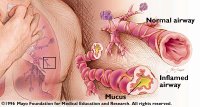Watch out for these possible allergens

1)Pollen- Given off seasonally by trees, grass and weeds, pollen is responsible for triggering most cases of allergic rhinitis (hay fever). Individuals with this allergy should avoid yard work, and stay indoors, with windows closed and the air conditioning running when pollen counts are high.
2) Molds - Often found indoors where the humidity is high, mold can easily become airborne and trigger cases of allergic rhinitis year-round. Running the air conditioner, using a dehumidifier and using a HEPA filter to remove airborne particles can help reduce exposure to mold.
3) Animal dander - Little bits of skin, feather or dried saliva from animals (usually cats and dogs) are responsible for many allergy symptoms. Individuals who are allergic to animal dander should remove pets from the home or, at least, the bedroom.
4) Dust mites - These microscopic insects live in the dust found indoors and often trigger allergy symptoms. Special coverings for the bed, box springs and pillows can help reduce exposure to dust mites.
5) Eggs - One of the most common types of food allergy, egg allergies are common in children, but usually are outgrown by adulthood. Allergic individuals should remove eggs, products containing eggs and products derived from eggs completely from the diet.
6) Seafood - This type of food allergy is characterized by an allergic reaction to ingested fish or shellfish. Anyone with this sort of allergy should avoid eating fish and shellfish as well as any food with fish or shellfish as an ingredient.
7) Latex - Allergies to the sap in rubber trees cause some people to be allergic to latex products (made from rubber tree sap), usually when skin-to-skin contact is made. People with this allergy should avoid contact with any latex product, including latex clothing, gloves or condoms.
8) Peanuts - This food allergy is triggered by peanuts or any product that uses peanuts as an ingredient. Reactions can include life-threatening anaphylactic shock. A person with peanut allergies should remove peanuts and any food containing peanuts from their diet.
9) Penicillin - This common type of drug allergy can cause a range of symptoms including anaphylactic shock. The drug penicillin is commonly used to treat infections. Anyone allergic to penicillin should avoid using the drug and wear a medical alert bracelet or necklace.














0 Comments:
Post a Comment
<< Home